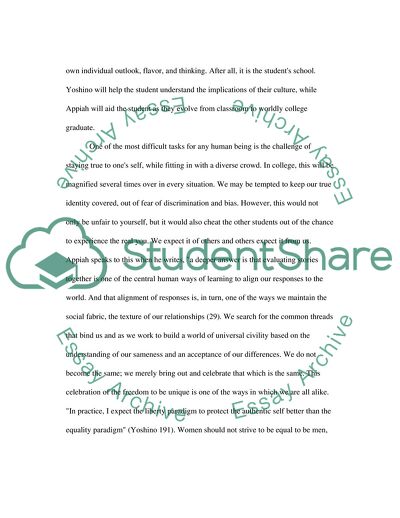
- Home
- Free Samples
- Premium Essays
- Editing Services
- Extra Tools
- Essay Writing Help
- About Us
- Studentshare
- Subjects
- Miscellaneous
- Having the advantage when beginning a college career
Having the advantage when beginning a college career - Essay Example

- Subject: Miscellaneous
- Type: Essay
- Level: Undergraduate
- Pages: 4 (1000 words)
- Downloads: 0
- Author: wbrekke
Extract of sample "Having the advantage when beginning a college career"
Two authors, Kenji Yoshino and Kwame Appiah, have recently addressed the problems confronting the diverse world of globalization. While they both advocate the justice and fairness that is due all people, they also have their differences. Yoshino warns that in the attempt to legislate equality, we have institutionalized conformity. In doing so we lose the very characteristics that make us unique. Appiah contends that as human beings we all possess cosmopolitanism, a worldly sense of shared ideals, principles, and moral obligations to our fellow man.
From Appiahs point of view, we are more alike than different. Yoshino contends that our differences mark out individuality. Whose school is it anyway? Students may wish to be cosmopolitan, and to shrink from their own uniqueness and just try to do their best at fitting in. Yoshino argues that it is the students responsibility to bring to the experience their own individual outlook, flavor, and thinking. After all, it is the students school. Yoshino will help the student understand the implications of their culture, while Appiah will aid the student as they evolve from classroom to worldly college graduate.
One of the most difficult tasks for any human being is the challenge of staying true to ones self, while fitting in with a diverse crowd. In college, this will be magnified several times over in every situation. We may be tempted to keep our true identity covered, out of fear of discrimination and bias. However, this would not only be unfair to yourself, but it would also cheat the other students out of the chance to experience the real you. We expect it of others and others expect it from us.
Appiah speaks to this when he writes, "a deeper answer is that evaluating stories together is one of the central human ways of learning to align our responses to the world. And that alignment of responses is, in turn, one of the ways we
...Download file to see next pages Read MoreCHECK THESE SAMPLES OF Having the advantage when beginning a college career
Impact of Financial Aid on Educational Environment
High school graduates
Compare and Contrast a Big College Campus to a Small College Campus
Evolution of Womens Roles in Society
The History of African American Education in America
The Evolution of Womens Roles in Society
Analysis of Saudi Aramco and Marathon Petroleum Corporation's Websites
Gender Dynamics in College Education

- TERMS & CONDITIONS
- PRIVACY POLICY
- COOKIES POLICY